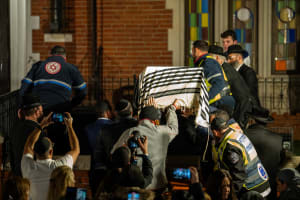Who is Sheikh Naim Qassem, the newly appointed leader of Hezbollah?
Qassem has been a leading figure in Hezbollah for over 30 years

On Tuesday morning, the Lebanese terror group Hezbollah announced the election of Sheikh Naim Qassem as the new head of the group, following the killing of former leader Hassan Nasrallah.
In a statement on the group’s Telegram channel, it announced: “Based on faith in God Almighty, commitment to the authentic Muhammadan Islam, adherence to the principles and goals of Hezbollah, and in accordance with the approved mechanism for electing the Secretary-General, the Shura Council of Hezbollah agreed to elect His Eminence Sheikh Naim Qassem as Secretary-General of Hezbollah, carrying the blessed banner in this journey, asking God Almighty to guide him in this noble mission in leading Hezbollah and its Islamic resistance.”
The terror group pledged to “work together to achieve the principles of Hezbollah and the goals of its path, and to keep the flame of resistance shining and its banner raised until victory is achieved,” saying it would continue the path of Nasrallah.
While Naim Qassem was a well-known figure within Lebanon, he rose to international prominence mostly after the killing of longtime Hezbollah leader Hassan Nasrallah.
Naim Muhammad Naim Qassem, more commonly known as Sheikh Naim Qassem, was born in the Basta al-Tahta area of Beirut, Lebanon, in 1953 to a Shia Muslim family. Qassem grew up in Beirut and studied Islamic theology under Ayatollah Mohammad Hussein Fadlallah while also pursuing a Bachelor of Science degree in Chemistry from Lebanese University, taught in French.
Qassem was a founding member of the Lebanese Muslim Students Union in the 1970s.
Qassem has been a leading figure in Hezbollah as one of its chief ideologues, as well as one of its founding members. He was part of a network of radical scholars – including Abbas al-Mousaoui, Subhi al-Tufaili, Mohammad Yazbek, Ibrahim Amin al-Sayyed, and Hassan Nasrallah – who founded Hezbollah in 1982.
Considered by many in Lebanon to be the voice of Hezbollah, Qassem was elected as the party’s deputy secretary-general on May 22, 1991. He served under Secretary-General Abbas al-Mousaoui until he was assassinated in 1992. Qassem continued in that position when Nasrallah replaced al-Mousaoui. Qassem is also a member of Hezbollah’s Shura Council and is in charge of overseeing its parliamentary and governmental activities.
Qassem steps into the leadership role of Hezbollah at a difficult time for the terror group. His predecessor, Sheikh Hassan Nasrallah was killed in a "targeted strike" by the IAF on Hezbollah’s underground headquarters, beneath a residential building in Dahiyeh, in late September. Nasrallah’s cousin, Hashem Safieddine, was seen initially as the likely successor. However, only a week later, Safieddine was killed in another Israeli airstrike.
Before the surprise airstrike that killed Nasrallah, Hezbollah was rocked by a series of Israeli operations that changed the almost year-long status quo of Hezbollah rocket barrages followed by a few retaliatory IDF strikes on launchers.
While the Israeli defense leadership had been stating for months that the country would have to deal with Hezbollah in order to return the evacuees to their homes in Israel’s northern border communities, the IDF’s focus appeared to be firmly fixed on the fighting in Gaza.
After the pager operation, which killed dozens of Hezbollah operatives and injured and incapacitated thousands more, Israel upset that status quo in an unexpected way.
Over the next couple of weeks, in a series of precise strikes on Hezbollah leadership and positions, the IDF indicated that it was ready to engage Hezbollah directly and abandon the previous tit-for-tat approach.
After the killing of Nasrallah, Qassem made two televised speeches, both from undisclosed locations. In the first speech, on Sept. 30, Qassem appeared to be nervous and sweating profusely. In that speech, Qassem claimed that Hezbollah was still able to fight against Israel, despite the “painful blows” it had received. He said that Hezbollah would choose a successor to Nasrallah “at the earliest opportunity” and said the group was ready for an IDF ground incursion.
“We will confront any possibility, and we are ready if the Israelis decide to enter by land,” Qassem stated. “The forces of the resistance are ready for a ground engagement.”
In the second speech, Qassem, appearing a little more confident, despite the recent killing of Hashem Safieddine, claimed that Hezbollah had filled the leadership positions vacated by Israel’s targeted killings.
In that speech, Qassem claimed that the terror group’s war with Israel was a matter of “who cries first.” Hezbollah, Qassem pledged, would not cry first.
Reports in Arab and Israeli media claim that Naim Qassem fled to Iran on Oct. 5, shortly before his second speech. He has not publicly addressed the group or the media since Oct. 15.
UAE-based Aram News website said Qassem’s move to Tehran came at the orders of Iran, over fears he would also be targeted by Israel.
Shortly after the announcement of Qassem’s appointment to the position, Defense Minister Yoav Gallant posted a message to 𝕏, hinting that the new leader would not last long.
Temporary appointment.
— יואב גלנט - Yoav Gallant (@yoavgallant) October 29, 2024
Not for long. pic.twitter.com/ONu0GveApi

J. Micah Hancock is a current Master’s student at the Hebrew University, pursuing a degree in Jewish History. Previously, he studied Biblical studies and journalism in his B.A. in the United States. He joined All Israel News as a reporter in 2022, and currently lives near Jerusalem with his wife and children.
You might also like to read this:














